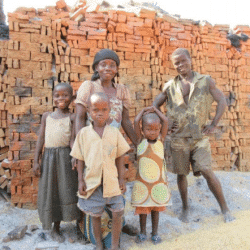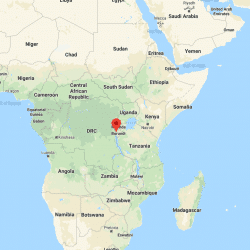
I, Pygmy, between the Tutsis and the Hutus
Dorothée
Transcribed and presented by Albina du Boisrouvray, founder of FXB.
My name is Dorothée, I am about 32 years old, I say about because in my country, Burundi, the Batwa ethnic group to which I belong has no official papers or birth certificate.
Our extreme poverty, the discrimination we suffer and our ignorance exclude us from it. We are not counted, it is agreed to say that we represent more or less 1% of the Burundian population. So, how can we have access to other rights?
We are the Pygmies.
Also spread out in Uganda, the Democratic Republic of Congo and Rwanda.
How can we defend ourselves before justice?
Being Pygmy in Africa
FXB’s social workers have informed us that none of these countries have ratified a convention: the ILO Convention 169 on Indigenous and Tribal Peoples, which forms the basis of international human rights legislation for indigenous peoples. Rights that FXB tells us a lot about and insists on article 28 of another convention: that of the rights of the child.
Whenever FXB’s Founder, Albina, visits, she insists that the translators tell our children that our country has “ratified” this convention, i.e. has promised that all children, without exception, have the right to education and that we should at least know this so that we can demand it if possible. For she reminds us that our country’s literacy rate stands at 59.3%.
Our country, Burundi, is said to have 11.5 million inhabitants, 65% of whom live below the poverty line, which was the case for my husband and I before we entered the FXB Villages program.
I come from a town about 40 kilometres north of Bujumbura, the capital – Bubanza – which is divided into four zones, one residential, one administrative, one commercial and one popular where I come from. My husband is also a native of Bubanza, rural province, he is also approximately my age. We lived in Gimbu, a hill inhabited by the Batwa community. He was my neighbour.
With the crisis of 1993, Dieudonné, who was not yet my husband, fled at a very young age to the capital Bujumbura and landed in Buterere. Since the 1960s, ethnic clashes and massacres between the Hutus, who are the overwhelming majority of the population, and the Tutsi minority have been taking place very often.
We Batwa are the original inhabitants of the equatorial forests of Central Africa, but we have been displaced and marginalized since the 19th century by farmers, pastoralists and during the massive deforestation of the colonial period. We survive today. Some are still foresters, some are fishermen, most are potters. But in town pottery is no longer sold because the kitchen utensils are made of aluminium, our traditional pots have become useless.
While hunting and related activities constitute our cultural, economic and religious identity, the laws of what is our country, Burundi, do not recognize these hunting or fishing rights.
So, unable to engage in traditional activities, we are forced to emigrate to the big city, Bujumbura, whose infrastructure does not keep up with the arrival of so many people. And so it was that when in 2003 Dieudonné came back to Bubanza to ask for my hand in marriage, after our legal marriage, we returned together to live in Buterere, a district whose garbage dump centralizes the garbage of all Bujumbura.
We Batwa, the Pygmies of Burundi, are usually considered as sub-humans.
Our traditional way of life of forest nomadism is considered by some as a way of life close to that of the animals, our food is considered disgusting and taboo.
Others portray our way of life as immoral and depraved.
As a result, we are kept away from public places, we are not allowed to sit next to each other and we are not allowed to touch cooking utensils.
Despite the fact that our country has apparently promised education for all, the famous article 28 of the convention for children, very few find money for school where they are subjected to bullying and discrimination by students and sometimes even teachers.
Families also often need children to collect honey, harvest and beg.
All this does not leave much time for a school timetable.
When you don’t have an education, you can’t find a job, and this reinforces the myth that we lack aptitude and intelligence.
However, our social worker tells us not to lose hope that the situation is changing: there are a few Batwa students at the University of Burundi, more than a hundred in secondary school and more than 3,000 in primary school.
As political life does not let us participate in the management of the country, we were informed that the cooptation, but not the election, of three of us to the Parliament and three others to the Senate, although symbolic presence, is a first step towards participation in commissions that manage our country.
In the meantime, Dieudonné Nuyonjuru, who became my husband when he was single, spent his days at the central market in Bujumbura, carrying the luggage of people who came for supplies. He earned a little money. He thought of me and when he was able to save BIF 30,000, he was able to pay the dowry and marry me.
When he courted me to marry me, he told me that he had a good job in Bujumbura that paid well. But after the marriage, he was ashamed to do the porter’s job and we had no more resources. We lived off the rubbish dump of Buterere. Life was not easy, we went to the dump every morning to find food there and at home.
I always had stomach aches and often vomited. I thought it was a pregnancy sickness. But it was due to the way I was eating. Without money, I couldn’t see a doctor, and three of my children died one after the other. The others didn’t go to school, which my husband and I never went to.
Again, if we tried to go to a health centre, we were not well received by the health workers and were not allowed to sit with the other patients.
Our only recourse was our traditional medicine, which is made of herbs and other recipes but does not cure everything.
Everything has changed with the FXBVillage program
In 2014, the FXB team came to select the families that would benefit from the VillageFXB program. I was crying, I was full of grief, I told them my story in tears, they listened to me and I entered the Buterere II FXBV program.
Since then, everything has changed in our family. The eating pattern first. FXB provided us with food for nine months, I received food training and social worker Gisèle did the follow-up at home.
Of course, I left the garbage dump right away, an environment that brought me nothing and made me sick, and FXB gave me what I needed to start a small business. I sell food and I baked bricks that the rich people of Bujumbura buy to build their houses.
I keep regular savings at the small micro-savings counter. I sell 40 BIF pieces of my bricks and the oven donated by FXB has already produced twelve thousand. In addition, after two years, I currently hold a little more than 200,000 BIF in my bank account.
Hygiene has appeared at home: I sleep in a clean room, I keep my kitchen utensils and we have toilets and a hand washing station. Regularly, I take care of my personal hygiene and that of my children. So many flies were in my house! Now, I have brought this invasion under control thanks to the cleanliness of the equipment, the food and my regularly washed hands.
I had a lot of conflicts with my husband, everything is back to normal. Together we take care of the development of our family. Three children have gone to school thanks to the support of FXB and are doing very well. My 12-year-old daughter, Francine, is in the second year of primary school.
The veil of poverty that covered my face is now torn. I smile all the time and am confident in my future. I am at peace. I have a project to buy myself a field to grow food. Now I am able not to use all my savings because I think I am eligible for a microcredit and I will be one of the few Batwa to own land in Burundi.
Note from Albina du Boisrouvray
Dorothée asked me to say that for her, God brought FXB into her home and she wants to thank the FXB Association and its donors, the Arcanum Foundation, the Corbier Fund and Swim for Life “who have,” she says, “given me back my life and dignity. “I have regained my dignity, my family eats three times a day and no longer shares food with the goats and pigs in the dump. I am sure that no matter what happens I will never go back to the dump, thanks to FXB, I have learned everything but most of all how to live with dignity.”
